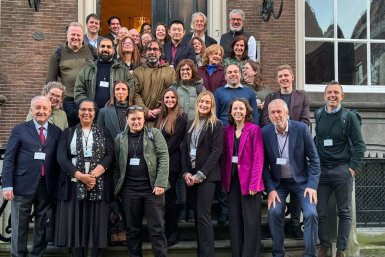Utrecht University Works on Enhancing Implementation of Innovative Methods in Health Technology Assessment Practice
To make sure that the methods used to determine whether new forms of health care should be reimbursed or not are future-proof and well-suited to the forms of health care being assessed. That is the goal of the European SUSTAIN-HTA project, in which fifteen partners, both from academia and the assessment practice, will be collaborating over the next four years. The project, led by Utrecht University, covers all kinds of healthcare but focuses on medicines and medical devices. It is made possible by a Horizon Europe grant of five million euros.
Assessing drugs
Whenever a new medicine or medical device hits the market, the question arises as to whether the treatment should actually be reimbursed and subsequently used in clinical practice. Each country has its own set of protocols for this evaluation, typically conducted by health technology assessment (HTA) organizations. In the Netherlands, for instance, the National Health Care Institute offers recommendations to the Ministry of Health regarding which medicines should be covered under the basic healthcare package. Numerous factors come into play when making these decisions, including the drug’s effectiveness, cost-effectiveness, and ethical considerations.
Advancements in healthcare
The evolving landscape of healthcare has prompted questions about whether the evaluation methods used by assessment organizations remain aligned with current and future practices. Wim Goettsch, professor of Health Technology Assessment of Pharmaceuticals at Utrecht University and project leader of SUSTAIN-HTA, explains: “For instance, in the past, the focus for medicines was primarily on treatments prescribed to large groups of people. Assessing effectiveness involved examining their impact on the average patient. However, contemporary healthcare uses more personalized approaches, with medicines designed for smaller, more specific patient populations. The question arises whether the existing methods are equipped to address these developments?”
Identifying needs
Goettsch notes that numerous (European) research projects are currently funded to develop HTA methods tailored for more personalized forms of care. Nonetheless, he observes that organizations such as the Dutch National Health Care Institute hardly incorporate these new methods in their practice. Goettsch: “A big gap exists between the development of methods and their implementation. With our new project, our aim is to facilitate the implementation of these methods into practice if there is need from HTA organisations . It serves as a nice example of valorization, where we make the connection between scientific advancements and real-world application.”
We hope that, gradually, we can bring on board all European HTA organization
SUSTAIN-HTA is a collaborative effort between academic groups and a number of HTA organizations. Goettsch: “We are going to identify the methodological needs of these HTA organizations. We will also compile a list of methods that have been developed in recent years. Additionally, we aim to assess which methods are currently described in the guidelines of the HTA organizations. Subsequently, we will analyse where these new methods can best be used and how their actual implementation can be shaped most effectively.”
At the European level
Another aspect where the project aims to make an impact lies in the realm of European collaboration. Previously, HTA procedures were confined to national domains, with each country having its own distinct procedures. However, a new European law, which goes into effect in 2025, mandates that the clinical evaluation of drugs (and at a later date, also medical devices)—the assessment of the effectiveness of a drug in comparison to existing treatments—must be conducted at the European level. SUSTAIN-HTA seeks to actively support the advancement of methods tailored for these
Platform
While several HTA organizations are currently engaged in the project, far from all European organizations are involved. Goettsch: “Getting all European HTA organizations on board will be a substantial challenge. There is a quite wide range of perspectives on methods across Europe. For instance, opinions vary greatly on the importance of real-world clinical data in the assessments; using these data can only be facilitated by the development and use of specific methods. However, we hope that, gradually, we can bring everyone on board in our effort to implement new HTA methods if they fulfil the needs from HTA organisations.”
Goettsch is also exploring avenues to ensure the sustainability of the project’s objectives even after its finalization. He envisions the establishment of a permanent entity arising from the project. Goettsch: “Perhaps a new platform needs to be established, or we could perhaps join existing entities. This is something we will investigate in the coming period.”

